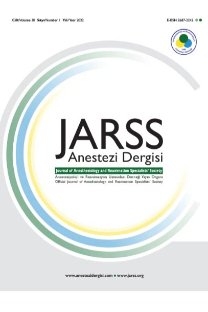Hipertermik İntraperitoneal Kemoterapi Yapılan Hastalarda İntraoperatif Restriktif Sıvı Tedavisinin Postoperatif Sonuçlar Üzerine Etkisi
The Effect of Intraoperative Restrictive Fluid Therapy on Postoperative Outcomes in Patients Undergoing Hyperthermic Intraperitoneal Chemotherapy
___
- 1. Baratti D, Kusamura S, Laterza B, Balestra MR, Deraco M. Early and long-term postoperative management following cytoreductive surgery and hyperthermic intraperitoneal chemotherapy. World J Gastrointest Oncol. 2010;15:36-43. https://doi.org/10.4251/wjgo.v2.i1.36
- 2. Elias D, Honore C, Ciuchendea R, et al. Peritoneal pseudomyxoma: results of a systematic policy of complete cytoreductive surgery and hyperthermic intraperitoneal chemotherapy. Br J Surg. 2008;95:1164-71. https://doi.org/10.1002/bjs.6235
- 3. Balakrishnan KP, Survesan S. Anaesthetic management and perioperative outcomes of cytoreductive surgery with hyperthermic intraperitoneal chemotherapy: A retrospective analysis. Indian J Anaesth. 2018;62:188- 96. https://doi.org/10.4103/ija.IJA_39_18
- 4. Kajdi ME, Beck-Schimmer B, Held U, Kofmehl R, Lehmann K, Ganter MT. Anaesthesia in patients undergoing cytoreductive surgery with hyperthermic intraperitoneal chemotherapy: retrospective analysis of a single centre three-year experience. World J Surg Oncol. 2014;12:136. https://doi.org/10.1186/1477-7819-12-136
- 5. Liang Y, Wang S. The best anesthesia regimen for patients undergoing cytoreductive surgery and hyperthermic intraperitoneal chemotherapy. Int J Surg. 2015;19:103. https://doi.org/10.1016/j.ijsu.2015.05.022
- 6. Sheshadri DB, Chakravarthy MR. Anaesthetic considerations in the perioperative management of cytoreductive surgery and hyperthermic intraperitoneal chemotherapy. Indian J Surg Oncol. 2016;7:236-43. https://doi.org/10.1007/s13193-016-0508-2
- 7. Shamavonian R, McLachlan R, Fisher OM, et al. The effect of intraoperative fluid administration on outcomes of patients undergoing cytoreductive surgery with hyperthermic intraperitoneal chemotherapy. J Gastrointest Oncol. 2019;10:235-43. https://doi.org/10.21037/jgo.2018.12.11
- 8. McQuellon RP, Loggie BW, Lehman AB, et al. Long-term survivorship and quality of life after cytoreductive surgery plus intraperitoneal hyperthermic chemotherapy for peritoneal carcinomatosis. Ann Surg Oncol. 2003;10:155-62. https://doi.org/10.1245/ASO.2003.03.067
- 9. Messina A, Robba C, Calabro L. et al. Perioperative liberal versus restrictive fluid strategies and postoperative outcomes: a systematic review and metanalysis on randomised-controlled trials in major abdominal elective surgery. Crit Care. 2021;25:205.
- 10. Myles PS, Bellomo R, Corcoran T, et al. Restrictive versus Liberal Fluid Therapy for Major Abdominal Surgery. N Engl J Med. 2018;378:2263-74. https://doi.org/10.1056/NEJMoa1801601
- 11. Rubinger DA, Cahill C, Ngo A, Gloff M, Refaai MA. Preoperative Anemia Management: What’s New in 2020? Curr Anesthesiol Rep. 2020;10:166-75. https://doi.org/10.1007/s40140-020-00385-7
- 12. Boland MR, Noorani A, Varty K, et al. Perioperative Fluid Restriction in Major Abdominal Surgery: Systematic Review and Meta-analysis of Randomized, Clinical Trials. World J Surg. 2013;37:1193-1202. https://doi.org/10.1007/s00268-013-1987-8
- 13. Varadhan KK, Lobo DN. A meta-analysis of randomised controlled trials of intravenous fluid therapy in major elective open abdominal surgery: getting the balance right. Proc Nutr Soc. 2010;69:488-98. https://doi.org/10.1017/S0029665110001734
- 14. Brandstrup B, Tonnesen H, Beier-Holgersen R, et al. Effects of Intravenous Fluid Restriction on Postoperative Complications: Comparison of Two Perioperative Fluid Regimens. Ann Surg. 2003;238:641-8. https://doi.org/10.1097/01.sla.0000094387.50865.23
- 15. Miller TE, Pearse RM. Perioperative fluid management: moving toward more answers than questions a commentary on the RELIEF study. Perioper Med. 2019;8:2. https://doi.org/10.1186/s13741-019-0113-3
- 16. Eng OS, Dumitra S, O’Leary M, et al. Association of fluid administration with morbidity in cytoreductive surgery with hyperthermic intraperitoneal chemotherapy. JAMA Surg. 2017;152:1156-60. https://doi.org/10.1001/jamasurg.2017.2865
- 17. Hendrix RJ, Damle A, Williams C, et al. Restrictive intraoperative fluid therapy is associated with decreased morbidity and length of stay following hyperthermic intraperitoneal chemoperfusion. Ann Surg Oncol. 2019;26:490-6. https://doi.org/10.1245/s10434-018-07092-y
- 18. Rothfield KP, Crowley K. Anesthesia considerations during cytoreductive surgery and hyperthermic intraperitoneal Chemotherapy. Surg Oncol Clin N Am. 2012;21:533-41. https://doi.org/10.1016/j.soc.2012.07.003
- 19. Doherty M, Buggy DJ. Intraoperative fluids: how much is too much? Br J Anaesth. 2012;109:69-79. https://doi.org/10.1093/bja/aes171
- 20. Reinhart K, Perner A, Sprung CL, et al. Consensus statement of the ESICM task force on colloid volume therapy in critically ill patients. Intensive Care Med. 2012;38:368-83. https://doi.org/10.1007/s00134-012-2472-9
- 21. Hakeam HA, Breakiet M, Azzam A, Nadeem A, Amin T. The incidence of cisplatin nephrotoxicity post hyperthermic intraperitoneal chemotherapy (HIPEC) and cytoreductive surgery. Ren Fail. 2014;36:1486-91. https://doi.org/10.3109/0886022X.2014.949758
- 22. Raspe C, Piso P, Wiesenack C, Bucher M. Anesthetic management in patients undergoing hyperthermic chemotherapy. Curr Opin Anaesthesiol. 2012;25:348-55. https://doi.org/10.1097/ACO.0b013e32835347b
- 23. Schmidt C, Moritz S, Rath S, et al. Perioperative management of patients with cytoreductive surgery for peritoneal carcinomatosis. J Surg Oncol. 2009;100:297- 301. https://doi.org/10.1002/jso.21322
- 24. Arjona-Sánchez A, Cadenas-Febres A, Cabrera-Bermon J, et al. Assessment of RIFLE and AKIN criteria to define acute renal dysfunction for HIPEC procedures for ovarian and non-ovarian peritoneal malignances. Eur J Surg Oncol. 2016;42:869-76. https://doi.org/10.1016/j.ejso.2015.12.016
- 25. Esteve-Pérez N, Ferrer-Robles A, Gómez-Romero G, et al. Goal‑directed therapy in cytoreductive surgery with hyperthermic intraperitoneal chemotherapy: a prospective observational study. Clin Transl Oncol. 2019;21:451-8. https://doi.org/10.1007/s12094-018-1944-y
- 26. Owusu-Agyemang P, Arunkumar R, Green H, Hurst D, Landoski K, Hayes-Jordan A. Anesthetic management and renal function in pediatric patients undergoing cytoreductive surgery with continuous hyperthermic intraperitoneal chemotherapy (HIPEC) with cisplatin. Ann Surg Oncol. 2012;19:2652-6. https://doi.org/10.1245/s10434-012-2319-1
- 27. Pang Q, Liu H, Chen B, Jiang Y. Restrictive and liberal fluid administration in major abdominal surgery. Saudi Med J. 2017;38:123-31. https://doi.org/10.15537/smj.2017.2.15077
- 28. Rahbari NN, Zimmermann JB, Schmidt T, Koch M, Weigand MA, Weitz J. Meta-analysis of standard, restrictive and supplemental fluid administration in colorectal surgery. Br J Surg. 2009;96:331-41. https://doi.org/10.1002/bjs.6552
- ISSN: 1300-0578
- Yayın Aralığı: Yılda 4 Sayı
- Başlangıç: 1993
- Yayıncı: Betül Kartal
Ümit Karadeniz, Hülya Yiğit Özay, Demet Bölükbaşı, Perihan Kemerci, Nevriye Salman, Aslı Demir
Hakan Yılmaz, Baturay Kansu Kazbek, Ülkü Ceren Köksoy, Filiz Tüzüner, Züleyha Kazak Bengisun
Türk Tıp Tarihinde Palyatif Bakım
Zeliha Aslı Demir, Hülya Yiğit Özay, Eda Balcı, Melike Kaya Bahçecitapar
Semra Gümüş Demirbilek, Canan Gürsoy, Çiğdem Sezgin
Mustafa Caner Okkaoğlu, Adem Selvi, Gökhan Yıldız, Erbil Türksal, Rıdvan Özbek, Esra Özayar
Anestezi ile İlgili Tıbbi Atıkların Bertaraf Maliyetlerini Azaltmada Eğitimin Rolü
Şiddetli Covid-19 Tedavisinde İntravenöz İmmünglobulin Kullanımı: 3 Hastalık Olgu Sunumu
Muhammet Korkusuz, Nuh Kumru, Saliha Yarımoğlu, Tayfun Et, Rafet Yarımoğlu
COVID-19 Pandemisinin Türkiye’deki Kan Kaynak ve İhtiyacı Üzerine Etkisi
Wilson Hastalığı Olan Gebede Sezaryen için ID Spinal Anestezi Uygulaması
